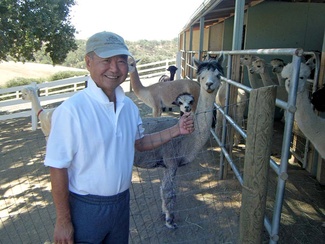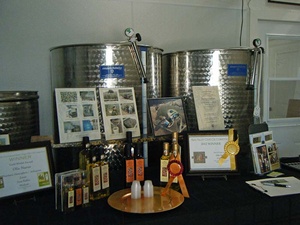… in French, literally means “soil”. Today it is nuanced to refer to products of a soil and more specifically those that are unique to a particular regional terroir.
This essay began simply enough but nearly spiraled out of control the more I learned about the person you are about to meet. As a writer sometimes the story finds you.
So, in August of 2012 I visited the annual Paso Robles Olive Festival. If you can get past the craft birdhouses and tarot card readers you can actually meet people who are presenting and really are bottling and selling olive products, especially olive oils. I found my way to Olio Nuevo and tasted some samples which I really liked. The guy who was selling at the booth was this very genial man named Art Kishiyama. It turns out he’s also the president of the Central Coast Olive Growers. He’s head of the class and so are his olive oils. I bought a bottle of his Extra Virgin Reserve Blend which Art autographed with a gel pen flourish. I’m now beginning to like this guy. I tested his oil at home and really enjoyed its buttery flavor and peppery finish which made it useful for several things.
After that I e-mailed Art and asked if I could possibly come down and visit his ranch off Hwy 41 E and he graciously invited me. He was kind enough to let me spend an entire morning with him. What I wasn’t expecting were the alpacas.
When I arrived Art gave me his brief bio; he attended Cal Poly, enlisted in the Air Force where he advanced to the rank of colonel. After twenty six years of service he became the top exec for the Disney Parks in Japan which pull in 30m visitors per year. Kind of stressful. He and his wife Lynn came back to California and in 2002 purchased their estate in Paso Robles. He began raising llamas and alpacas but eventually began planting olives. The alpacas with Italian names like Tintoretto and Valentino are still there.
After visiting with the Italians Art walked me over to his “terroir”, the ten acres where he has planted mission, manzanillo and arbequina olives. His groves slope steeply 75 feet from the top rows to the bottom ones. This affects temperature as much as 10°F. Also the soil composition seems to be different on the west side of his ranch than on the east side. All of which means the grower has to be nimble in addressing these issues. Art doesn’t use mechanical harvesting tools. Instead he goes out and tapes off the areas which he wants his guys to pick based on ripeness. This is all done by hand. After the olives are picked they are trucked a short way down the road to be pressed.
Art bottles, labels and ships 7,000 bottles all by himself. Really. Mr. Kishiyama is justly proud of the awards his oils have won. His Estate Arbequina earned him a Gold Medal at the Los Angeles International Olive Oil Competition 2012. He won Best in Class with his Reserve Blend at the Napa County Fair.
Afterward we went inside out of the heat and discussed what it means for an oil to really qualify as “extra virgin”. The key factors are taste and acidity. The International Olive Council (IOC) requires no more than .8% acidity in order to be certified. The United States is not a member of IOC so USDA handles the job. In 2010 they adopted standards close to those of IOC. Up until then they were using standards dating back to 1948 that were almost laughable. In fact they were more like those used for grading meat. The California Olive Oil Council (COOC) has standards that are even stricter requiring no more than .5% acidity. One of the most important retailers of olive oils in California (and I’m not talking about Trader Joe’s) won’t stock California oils that haven’t been properly certified by the lab. It’s not enough for the grower to say “I know it is extra virgin because I made it.” Nope. “Because I said so” just doesn’t cut it. For the record Mr. Kishiyama’s olive oils are COOC certified extra virgin. Anyway that’s plenty of acronyms for one paragraph.
Well, we shook hands and I drove off back to my office. However in the course of fact checking my story I could see that I needed to e-mail Mr. Kishiyama with some additional questions, and this is where I was thrown back a few paces. I learned some biographical things that you won’t find on his website. I rather naively asked Art if he was familiar with the Japanese American National Museum in Los Angeles (I’m asking this of a very well traveled gentleman, but then you don’t know until you ask). This is one of the most beautiful museum spaces in LA, and Art has had his parents’ names etched into the walls there.
Next follow up naïve question, “were your parents interned during the war?” Now I get blown back about twenty yards. During the war the L.A. County Fairgrounds in Pomona, beginning in May of 1942, were used as an “assembly center” for the internment camps. Art Kishiyama was the first baby born there. The center was closed a few months later and Art’s family (along with about 5,000 other souls) was moved from Pomona to Heart Mountain in Wyoming where his brother was born. After the camps the family moved to Ogden, Utah and another brother was born. All three brothers served in different branches of the service. All were officers of rank. Now I must conclude this with Art’s own words: “My parents had a son in Vietnam almost continuously for over 3 years. Despite being interned for 3 years during the War, they never stopped being Americans—and that’s the way they raised their sons.”
And this, to me, is what terroir means.
For more information on Olio Nuevo and where you can buy it go to www.olionuevo.com and for those Italian alpacas, www.alpacasofcripplecreek.com
This article was originally published on September 15, 2012 at http://eggsinpurgatory.blogspot.com.
© 2012 Bill Tierney





